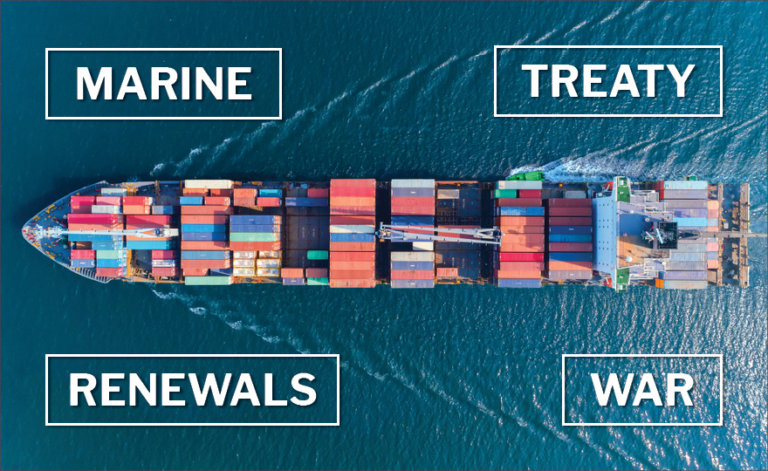Capital squeeze takes the wind out of Asia marine renewals
January 10 2023 by Marcus Alcock
In many respects, marine (re)insurance accounts in Asia have been better positioned going into these renewals than for other segments of the market. For a start, unlike those on the property and specialty sides of the fence, it’s fair to say that the marine market has not experienced a major market event in recent years which has impacted loss ratios and therefore had a knock-on effect on rating.
Furthermore, and largely as a result of Covid-19, marine activity had reduced (though it is once again picking up now), meaning that the marine market loss ratio for the APAC region has been relatively stable.
A challenging renewal for marine writers in the region has been partially influenced by Covid restrictions that have eased significantly, meaning that seaborne-trade has once again picked up, Ukraine conflict-related losses, and the broader issue of inflationary effects on claims.
Many reinsurance renewals for marine cedents have been extremely testing. Indeed, on the claims front there can be little doubt that reinsurers have been keen to push for meaningful rate increases given the increasing cost of marine claims for physical damage due to higher labour costs and the cost of raw materials.
Capacity for marine reinsurance, in tandem with the wider market, has fluctuated going into these renewals. Indeed, only last month Atrium Underwriters, the MGA for Lloyd’s Syndicate 609, which writes a global marine portfolio, announced that it was exiting marine reinsurance, with the decision to cease writing its marine excess of loss reinsurance book of business.
The exit came into effect as of January 1, 2023. In a statement, Atrium said that continuing in the class was deemed unviable as it looks to focus its efforts and capacity into direct specialty classes. It added that the underwriter of the marine reinsurance account, Andrew Hedges, will stay with the business for the foreseeable future to ensure the satisfactory run-off of the portfolio.
However, the general economic situation, limited premiums and relatively unsatisfactory loss ratio compared to the previous years have complicated placement of marine treaty, arguably one of the most easy-to-work-with markets in the past.
“Marine was the most difficult sector and whilst terms were available, markets were often sceptical,” said Wang Wei, chief executive at Hong Kong broker Rare Earth Insurance Partners. “Marine treaty, especially cargo, used to be one of the most flexible classes in the market, because the loss ratio for the whole market was good in the old days, especially in China.”
War risks
With seaborne trading picking up again, marine reinsurers have been keen to price for the increased possibility for losses. This includes keeping an eye on the continuing fall-out from the Russia-Ukraine war, especially with regard to potentially significant losses from trapped vessels, according to a recent briefing by the Association of Average Adjusters and the International Underwriting Association (IUA), which noted that marine markets face a profusion of ‘total loss’ claims for trapped ships early in 2023, one year after the shut-down of Ukrainian ports.
In APAC, non-proportional treaty prices went up 18-20%, especially for cat risks, noted Rare Earth’s Wei.
Ukrainian ports have been closed for vessel entry and exit since February 5, 2022, the day after the Russian invasion, and mines are reported to have been planted, effectively blocking as many as 100 vessels in ports and up rivers. The full value of vessels trapped is unclear but is understood to be in the US$800 million to US$1 billion range.
A lack of retrocessional capacity for war risks has also limited the potential to renew programmes across Russia, Ukraine and Belarus, according to Protection & Indemnity (P&I) clubs American, North, UK and West, who have indicated during that it is no longer able to offer war risk cover for some liabilities in the region from January 1.
In a statement the UK P&I Club said: “Due to the impact of losses from the Russian/Ukrainian situation affecting the availability of global insurance and reinsurance capacity, the Club's reinsurers are no longer able to secure reinsurance for war risk exposure to Russian, Ukrainian or Belarus territorial risks.”
“The Club's own reinsurances renew on January 1 and reinsurers have advised the Club that as a consequence they will no longer be able to support the Club for this exposure. As a result, the Club is forced to alter the scope of coverage afforded to Members for Charterers Liability and shipowners' extended and ancillary covers.”
Experts noted that political instability has partially influenced the market but was still far less relevant than bigger problem faced by underwriters of all classes – limited capacity, especially paired up with the losses results and limited premium.
“The war and sanctions have had their influence treaty placement, but far less than the market’s biggest issue – capacity. This year the situation is different: for all classes, even if an insurance company could get the deal with a reputable reinsurance leader, they had problems finding capacity from the markets,” Rare Earth’s Wei said.
With additional reporting from Kristina Shperlik.
-
Turbulence ahead for aviation market amid renewed warning over ‘downbursts’
- July 11
Australian airlines face increasing danger as weather risks multiply across the east coast.
-
‘Valuable partners for insurers’: APAC’s thriving MGA market set for significant growth, Guy Carpenter’s Steve Warwick says
- July 10
China, Japan and South Korea have longer-term potential alongside existing key regions as insurers increasingly show interest in this booming route to market.
-
Reinsurance market grapples with geopolitical risks amid renewals shift
- July 9
There is an acceleration in reinsurance rate reductions across the globe, but the question it raises is whether the softening will cool off, according to panellists at the reinsurance webinar co-hosted by IAN and Fitch Ratings last week.
-
Financial lines rate reduction should bottom out as potential large losses loom: Frontier Global’s Joel Pridmore
- July 8
Sector faces significant challenges, including major litigation such as class actions, regulatory scrutiny of Australian superannuation funds, cyber events, greenwashing, and the risk of under-reserving.
-
Allianz General | Allianz General combines innovative protection solutions while powering social good to lead Malaysian market
The insurer proactively addresses emerging risks and evolving customer protection needs while giving back to the community.
-
Sedgwick | Asia’s Energy Transformation – Balancing Growth, Risk and Renewables
Energy market presents unique risks, especially in a region which includes China and Japan as well as developing nations like Vietnam and the Philippines.
-
Beazley | Turbulent Waters: the maritime energy transition challenge
Businesses are facing a complex transition to non-carbon energy sources amid a push to achieve net-zero emissions for the marine sector by 2050.
-
Aon | Navigating shifts in the global and Asia insurance markets
Neelay Patel, Aon head of growth for Asia, says the market in Asia is at an ‘interesting stage of the cycle’.

